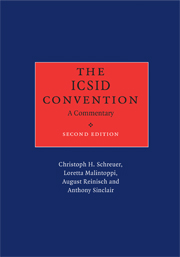Book contents
- Frontmatter
- Contents
- Foreword by Professor Sir Elihu Lauterpacht, CBE, QC
- Authors' preface to the second edition
- Table of cases
- List of abbreviations
- Text of the ICSID Convention
- Procedural calendar
- PREAMBLE
- CHAPTER I International Centre for Settlement of Investment Disputes
- CHAPTER II Jurisdiction of the Centre
- CHAPTER III Conciliation
- CHAPTER IV Arbitration
- Article 36 Request for Arbitration
- Article 37 Composition of Tribunal
- Article 38 Appointment by Chairman
- Article 39 Nationality of Arbitrators
- Article 40 Qualities of Arbitrators
- Article 41 Decision on Jurisdiction
- Article 42 Applicable Law
- Article 43 Evidence
- Article 44 Rules on Procedure
- Article 45 Default of a Party
- Article 46 Ancillary Claims
- Article 47 Provisional Measures
- Article 48 Award
- Article 49 Dispatch, Supplementation and Rectification
- Article 50 Interpretation
- Article 51 Revision
- Article 52 Annulment
- Article 53 Binding Force
- Article 54 Enforcement
- Article 55 State Immunity
- CHAPTER V Replacement and Disqualification of Conciliators and Arbitrators
- CHAPTER VI Cost of Proceedings
- CHAPTER VII Place of Proceedings
- CHAPTER VIII Disputes between Contracting States
- CHAPTER IX Amendment
- CHAPTER X Final Provisions
- Final Clause
- Consolidated bibliography
- Index by article
- Index by subject
Article 43 - Evidence
from CHAPTER IV - Arbitration
Published online by Cambridge University Press: 07 September 2010
- Frontmatter
- Contents
- Foreword by Professor Sir Elihu Lauterpacht, CBE, QC
- Authors' preface to the second edition
- Table of cases
- List of abbreviations
- Text of the ICSID Convention
- Procedural calendar
- PREAMBLE
- CHAPTER I International Centre for Settlement of Investment Disputes
- CHAPTER II Jurisdiction of the Centre
- CHAPTER III Conciliation
- CHAPTER IV Arbitration
- Article 36 Request for Arbitration
- Article 37 Composition of Tribunal
- Article 38 Appointment by Chairman
- Article 39 Nationality of Arbitrators
- Article 40 Qualities of Arbitrators
- Article 41 Decision on Jurisdiction
- Article 42 Applicable Law
- Article 43 Evidence
- Article 44 Rules on Procedure
- Article 45 Default of a Party
- Article 46 Ancillary Claims
- Article 47 Provisional Measures
- Article 48 Award
- Article 49 Dispatch, Supplementation and Rectification
- Article 50 Interpretation
- Article 51 Revision
- Article 52 Annulment
- Article 53 Binding Force
- Article 54 Enforcement
- Article 55 State Immunity
- CHAPTER V Replacement and Disqualification of Conciliators and Arbitrators
- CHAPTER VI Cost of Proceedings
- CHAPTER VII Place of Proceedings
- CHAPTER VIII Disputes between Contracting States
- CHAPTER IX Amendment
- CHAPTER X Final Provisions
- Final Clause
- Consolidated bibliography
- Index by article
- Index by subject
Summary
INTRODUCTION
Provision for the power of an international court or tribunal to take evidence is a standard feature in instruments governing international adjudication. Comparable clauses may be found in the Statute of the International Court of Justice (Arts. 49, 50 and 51), in the 1958 International Law Commission's Model Rules on Arbitral Procedure (Arts. 17(2), 18), in the 1993 Permanent Court of Arbitration's Optional Rules for Arbitrating Disputes between Two States and in the 1993 Permanent Court of Arbitration's Optional Rules for Arbitrating Disputes between Two Parties Only One of Which Is a State (Arts. 24(2)(3) and 25(6)). Moreover, comparable clauses exist in the 1998 International Chamber of Commerce Rules of Arbitration (Art. 20), in the 1976 UNCITRAL Arbitration Rules (Arts. 16(2)(3), 24(2)(3), 25, 27) and in the 1985 UNCITRAL Model Law on International Commercial Arbitration (Arts. 24, 26).
The Preliminary Draft of the ICSID Convention did not have a provision on the tribunal's power to summon evidence (History, Vol. I, p. 196). It was inserted in the First Draft upon the suggestion of the delegate from the Central African Republic and remained almost unchanged (History, Vol. II, pp. 244, 269, 572, 805) (but see para. 68 infra). There was some suggestion to delete the Article and to relegate its contents to the Arbitration Rules (at p. 806).
- Type
- Chapter
- Information
- The ICSID ConventionA Commentary, pp. 640 - 671Publisher: Cambridge University PressPrint publication year: 2009



